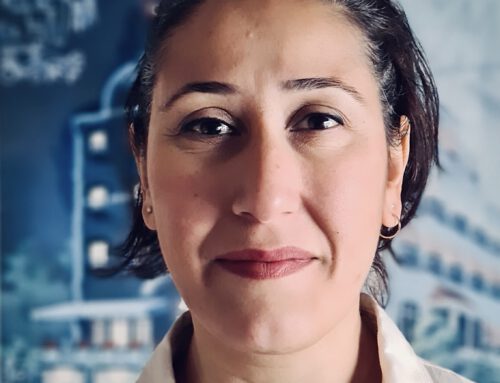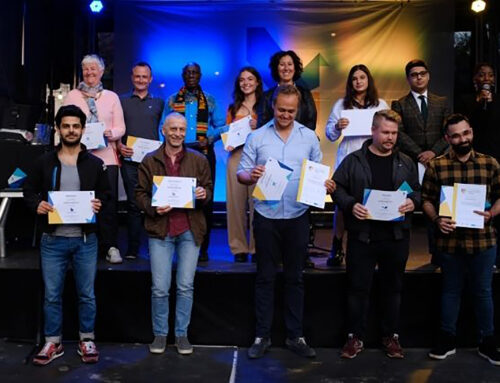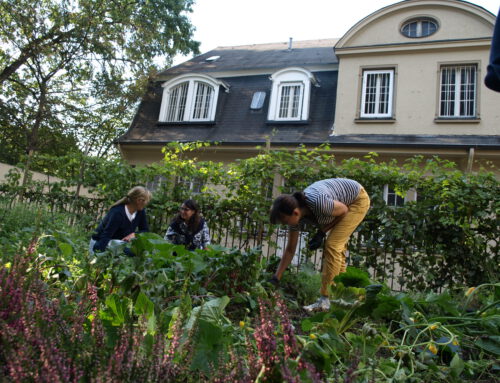This interview has conducted and published by solital.de on 14 April 2024. This page presents the English translation of the interview. Check the original page.
Burcu is known for empowering marginalized groups and individuals with her “Peace Garden.” This seems to be a thorn in the side of some. She has been attacked several times on the Internet with hate speech. The tenor: anyone who doesn’t speak German exclusively and doesn’t unconditionally refer to “Western values” is living in a parallel society and should do her best to keep her mouth shut or, better yet, leave the country.
Burcu describes the background and her thoughts on this in the following article. In view of hate speech on the Internet, she calls for disclosure, which is what makes solidarity and compassion possible in the first place. Above all, she believes that the state and the media have a duty to stop hate posts and to do more to prevent them from spreading in social media in the first place.
An obligatory response to hate speech
A contribution by Burcu Eke-Schneider
In 2020, we founded a “Peace Garden” at the Alevi Cultural Center in Wuppertal. The goal here was to: 1.) find just and sustainable solutions for urban redevelopment to combat climate change, and 2.) develop new methods of dialogue with the help of peace science. This process started with exploring the meaning of intercultural and interreligious dialogue in/with nature and further developed into scientific research work, among other things.
The press and the academic world showed interest in these studies. As a result, Karin Jäger – a journalist from Deutsche Welle – visited the Peace Garden and wrote an article about this multicultural, nature-based and transformative concept in the “Knowledge & Environment” section. In her article, she pointed out the importance of such diverse urban gardens for building peace, fighting for climate justice, protecting biodiversity, and growing healthy food for future generations. And she cited the Wuppertal Peace Garden concept as a good example.
However, immediately after the publication of the article, there were racist attacks by the moderators Turmfalke, Realist59 and Cherusker on an alternative website (open-speech.com) on June 29 and 30, 2020. Here there were derogatory comments about the basic concept of Urban Gardening, the Peace Garden and also about me. What exactly was written, you can read at the following link: https://open-speech.com/threads/805672-Integration-durch-urbanes-G%C3%A4rtnern-Da-w%C3%A4chst-was-zusammen?p=1816987&fbclid=IwAR3X8QoOLlVrEPTdWmSKNColreS1DSFXrPqLg2eVABuTfEmzupMeVMxblX0#post1816987
Recently, there was another case of massive, negative rhetoric – this time on Karin Jäger’s Facebook account (Karin Lilli Jäger Hammer). Her topic? A street name in Düsseldorf in Arabic! Her posts arose in response to a tip from a friend (who lives in Wuppertal and had also been interviewed by Karin Jäger in the Friedensgarten) about some Japanese street names in the Japanese community in Düsseldorf. My friend asked why it was not possible to realize an Arabic street name in an Arabic-speaking community. In the course of the discussion with my friend about Arabic signage, Karin Jäger mentioned me and presented me as a negative example – and this after the two of us had not been in contact for years. She wrote:
“We have enough problem cases in our own country. And therefore we don’t need to let in more from countries that don’t accept our values and culture. Don’t you live in Wuppertal, where Muslims wanted to introduce Sharia law? And weren’t you present at the interview in which the Turkish-born wife of the opera director and self-proclaimed peace activist didn’t speak a word of German because she found the language too difficult? I would not like to have such people living in a parallel society in Germany….”
In light of this discourse, I think it is important for me to speak out – and not just in terms of my language skills. I speak my native language, Turkish, fluently, of course. I speak English fluently. And: during the original conversation with Karin Jäger, I spoke German with her. However, this is not the crucial thing. Rather, I have recognized and demonstrated in my studies that it is of central importance to respect the language skills of the individual at all stages of learning. This is one of the most important prerequisites for building the trust that is necessary if a resilient community is to be formed. If one is not willing to do this, one will fail.
As a peace worker, I study how violence emerges and spreads. I then develop scientific dialogue methods based on nature-based solutions. In my experience, it is important that we find new transformative methods to combat hate speech. I have been advocating for justice, free speech, human rights, etc. for many years. In doing so, this is not the first time I have been discriminated against or offended by people on the side of power. People who do not want to change or who hate change. In the case described, it is our responsibility to act against this violence without stepping back. This is our duty!
From the above, you can see how some hate speech/racism/xenophobia started years ago, accumulated, and eventually persisted at heightened levels. As someone who has worked in the press, I know the importance of addressing hate speech in all its many channels of communication, especially social media. This can – and must – be done in a number of ways:
1. EXPOSURE
Instead of being passive, it is important to be active by seeking the widest possible publicity in response to these types of hate speech and xenophobic attacks. This was first implemented by my friend who sent me the Facebook post Karin Jäger. Subsequently, I also made this problem visible in my own communication (including this one).
2. SOLIDARITY and SHARING
When working at the micro level, it is very healthy for individuals to share this process with others, as solidarity from the surrounding community gives people the feeling that they are not alone in constructive resistance.
In my case, there was a lot of solidarity – including from the SPD member of parliament Helge Lindh and many other actors in Wuppertal.
3. TAKE RESPONSIBILITY/ACTION
Third, the relevant authorities must take responsibility and ensure that hate speech is stopped as soon as possible. Deutsche Welle has taken its responsibility by contacting me directly and apologizing and removing Karin Jäger’s original article about the Peace Garden from its publications.
The above “steps” are important as an emergency action plan. However, such activities are all “after the fact.” Structural changes must also be made in the media (especially in social media such as Facebook, Twitter, etc., as well as the fake accounts found there) so that hate speech is not repeated over and over again. Essentially, the basic ethics and values of the press need to be reconsidered and transformed into peace journalism and constructive thinking. This includes relationships built after media coverage, preventive mechanisms against those who use social media and the Internet to spread hate, and ensuring that people are not allowed to use “freedom of expression” in negative ways.



